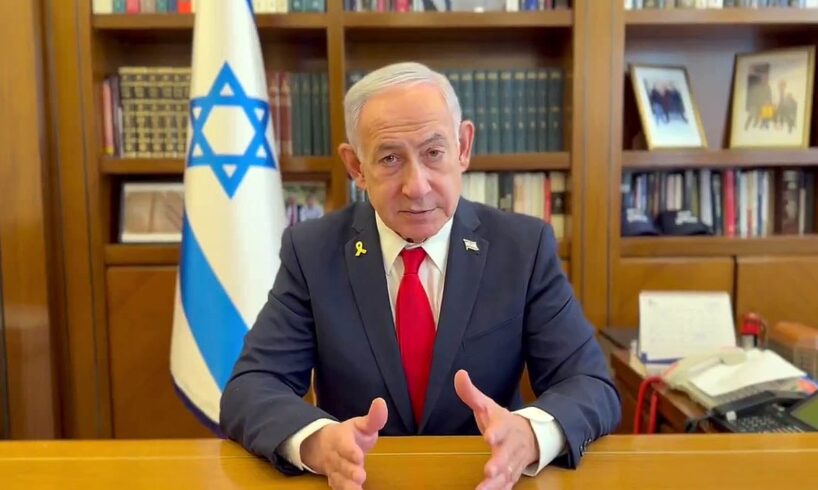
Prime Minister Benjamin Netanyahu said Tuesday that the Hamas terror group’s “obstinacy” was preventing a hostage-ceasefire deal in the Gaza Strip, as an Israeli defense source confirmed to The Times of Israel that officials have bandied about several potential next steps amid the impasse in negotiations, including beginning annexation of parts of the enclave.
After pulling their negotiators from talks in Qatar last week, US and Israeli leaders promised to explore new ways to bring home the 50 hostages still held in Gaza, 20 of whom are believed to be alive.
Netanyahu met Tuesday afternoon with top advisers to discuss the captives, with a picture published by his office showing he was joined by government hostage point man Gal Hirsch, political advisor Ophir Falk and chief of staff Tzachi Braverman.
After the meeting, Netanyahu posted a video message on X, in which he squarely blamed Hamas for the stalled negotiations.
The prime minister began by noting that, in addition to his Tuesday meeting, “There was a meeting [about the hostages] yesterday. Two days ago, there was a meeting. The day before that, there was a meeting, too.”
Get The Times of Israel’s Daily Edition
by email and never miss our top stories
By signing up, you agree to the terms
“Since the delegation returned from Qatar, we haven’t stopped trying,” he said. “But there is one major obstacle, and everyone knows it — Hamas. It remains obstinate in its refusal.”
“[United States] President Trump said it, [US special envoy Steve] Witkoff said it, we’re saying it — everyone who knows the facts, including the mediators, knows it,” Netanyahu continued.
“We are not letting up. We will continue to do everything we can — by one path or another. We are committed to bringing them home.”
Prime Minister Benjamin Netanyahu, right, meeting with aides Tzachi Braverman, second right, Ophir Falk, second left, and Gal Hirsch, on July 29, 2025. (Prime Minister’s Office)
Annexation among several ideas discussed in recent meetings
Netanyahu convened the meeting as an Israeli defense official told The Times of Israel that “talks are frozen.”
“Hamas still hasn’t come back to the table” with a new offer, the official said.
Netanyahu will hold further consultations on Gaza over the next two days, the official added.
The official confirmed that annexing parts of the Strip is one of several ideas that have been bandied about in recent meetings.
The Hebrew-language Maariv daily reported previously that Netanyahu recently presented the annexation proposal in a meeting with a small group of ministers, who decided to establish a special entity for administering annexed areas.
Two sources told ABC News that annexation is “one of several options” being explored by Netanyahu.
US special envoy Steve Witkoff said last week that the US would explore “alternative options” to free the hostages, and US President Donald Trump indicated that he would support Israel moving ahead with military operations to try to “get rid of” Hamas.
“Now possibly the fight will have to be a little bit different,” said Trump in Scotland on Monday, adding that he told Netanyahu that “you’re going to have to now maybe do it a different way.”
US President Donald Trump, right, speaks with the media as he greets Britain’s Prime Minister Keir Starmer at the Trump Turnberry golf course in Turnberry, Scotland, July 28, 2025. (AP/Jacquelyn Martin)
Though the Trump administration has shown firm support for Israel’s war on Hamas, European allies have been busy searching for ways to pressure Israel to alleviate the humanitarian situation in Gaza and to end the war.
The EU’s executive body on Monday recommended curbing Israeli access to its flagship Horizon research funding program.
Also Monday, the Netherlands banned far-right Finance Minister Bezalel Smotrich and National Security Minister Itamar Ben Gvir from entering the country. The Dutch government also summoned Israel’s ambassador to the Netherlands, Modi Ephraim, to denounce the “unbearable and indefensible” situation in Gaza.
Sa’ar to Dutch envoy: Palestinian state ‘ain’t gonna happen’
On Tuesday, Foreign Minister Gideon Sa’ar summoned Dutch Ambassador to Israel Marriet Schuurman for a reprimand over the measures the kingdom is pursuing against Israel.
According to his office, Sa’ar told her that the Netherlands “harmed the chances of reaching a ceasefire in Gaza and a plan for the release of hostages, strengthened Hamas’s refusal and actually raises the likelihood of a military escalation.”
Foreign Minister Gideon Sa’ar speaks during a press conference in Jerusalem, July 29, 2025. (Sivan Shachor/GPO)
Despite the European campaign, senior Israeli officials pledged on Tuesday that they would see the war through to victory over Hamas.
In a briefing to foreign journalists in Jerusalem, Sa’ar said that the “distorted campaign of international pressure” to end the war against Israel would not work.
“It ain’t gonna happen,” he said. “No matter how much pressure is put on Israel.”
And in a visit to the Tel Hashomer recruitment center, Defense Minister Israel Katz said that Israel must retain its freedom of action in Gaza, even after the war comes to an end.
“In order for Hamas to no longer be effective, the IDF must have the ability — like in the West Bank — to operate securely in every location there,” he said. “We ourselves must be responsible for security in Gaza.”
IDF troops are seen on the outskirts of Gaza City’s Daraj and Tuffah neighborhoods, July 23, 2025. (Emanuel Fabian/Times of Israel)
Meanwhile, Finance Minister Bezalel Smotrich told a conference that rebuilding settlements in Gaza is now a “realistic” option.
Addressing a conference at the Gush Katif Heritage Center marking two decades since Israel’s unilateral withdrawal from Gaza, the far-right minister said he does “not want to go back to Gush Katif — it’s too small, it needs to be much bigger, much more expansive.”
Gush Katif was the major bloc of Israeli settlements in Gaza before the Disengagement, housing some 8,500 people in 17 communities.
Germany, France, and UK may send FMs to Israel
Alarmed over the humanitarian situation in the Strip, Germany, France and Britain are considering sending their foreign ministers to Israel next week, German Chancellor Friedrich Merz said.
“We will probably ask the three foreign ministers of France, the United Kingdom and Germany to travel to Israel together next Thursday to present the position of … the three governments,” Merz told a press conference in Berlin alongside Jordan’s King Abdullah II.
The leading international authority on food crises said Tuesday the “worst-case scenario of famine is currently playing out in the Gaza Strip,” predicting “widespread death” without immediate action.
The Integrated Food Security Phase Classification’s warning followed other reports of an increasingly dire humanitarian situation in the Gaza Strip.
German Chancellor Friedrich Merz, right, and Jordan’s King Abdullah II leave a news conference after a meeting at the chancellery in Berlin, Germany, Tuesday, July 29, 2025. (AP/Ebrahim Noroozi)
Those reports led Israel on Sunday to declare that it would implement daily “tactical” pauses of fighting in swathes of Gaza, along with several other changes, to allow for the safe distribution of humanitarian aid.
Israel has denied using hunger as a weapon of war and has accused the United Nations and other aid agencies of failing to pick up and distribute supplies delivered to Gaza’s border crossing points.
It isn’t only in Europe where Israel sees its support for Gaza slipping. A new Gallup poll found that about six in 10 US adults disapprove of the military action Israel has taken in Gaza, up from 45% a month after the Hamas onslaught of October 7, 2023, which sparked the war.
The rising disapproval is driven by Democrats and independents, while Republicans remain largely supportive of both Israel’s military actions and Netanyahu.
In a new low, only 8% of Democrats and one-quarter of independents said they now approve of Israel’s military campaign.
Agencies contributed to this report.





